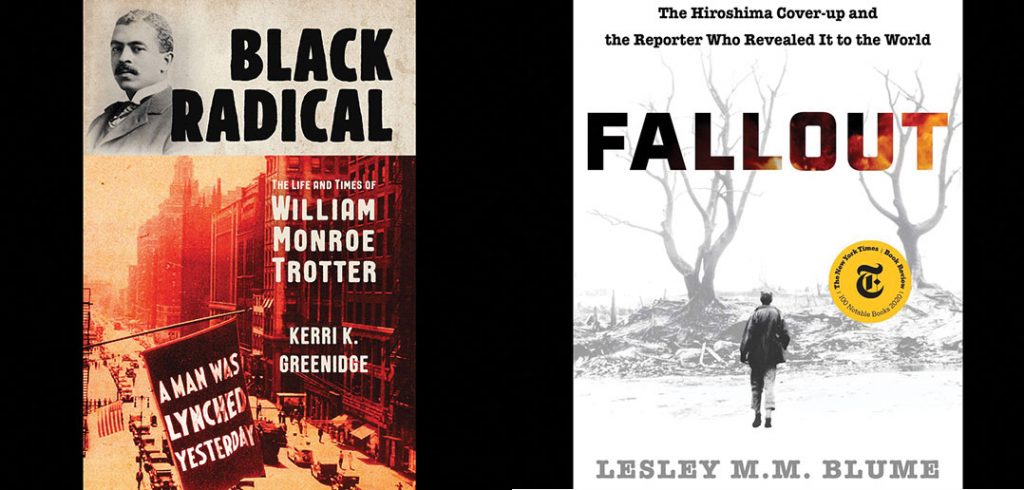It was a year of firsts for the Ann M. Sperber Book Prize, awarded to two authors on Nov. 3 during a virtual ceremony.
“It’s a historic year, the first time in our history that we had two authors honored, and the first time we’ve had two women honored,” said Father McShane, who presented the award to Kerri K. Greenidge, Ph.D., for her biography Black Radical: The Life and Times of William Monroe Trotter and Lesley M. M. Blume, Ph.D., for FALLOUT: The Hiroshima Cover-up and the Reporter Who Revealed It to the World, about war correspondent John Hersey.
The award ceremony for The Sperber Prize, given in honor of the late Ann M. Sperber, the author of Murrow: His Life and Times, a critically acclaimed biography of journalist Edward R. Murrow, took place via Zoom on Wednesday night. Through the generous support of Ann’s mother Lisette, the prize and its $1,000 award were established to promote and encourage biographies and memoirs that focus on a media professional; it has been presented annually by Fordham’s Department of Communication and Media Studies since 1999.
Beth Knobel. Ph.D., associate professor of communication and media studies and director of the Sperber Prize, said this year’s winning biographies were so well written and researched that the award had to be given to both authors. The winners will each receive $500 as prize money.
Both winners were asked about their inspirations and the research behind the behind writing their books. Both shared that they wanted to write the hidden stories of investigative journalists who documented atrocities happening in their communities and in their country.
“Black stories are always far more complex than we believe. Stories like Trotter’s ought to be as analyzed, discussed, and studied as Dubois, Garvey, King, and Malcolm X,” said Greenidge.
“It has been my hope, with Black Radical, to reorient the scholarship toward these stories, not as a form of hagiography or racial exceptionalism, but as a way to challenge ourselves to more completely reckon with our complicated and often painful racial history,” she said.
Blume explained how the attack on journalists during the Trump era influenced her motivations for writing Hersey’s biography.
“My research coincided with the Trump era. Suddenly and shockingly, America’s best journalists were dubbed enemies of the people by Trump his followers, and journalists began to be threatened,” said Blume. “My entire life, without exaggeration, has been centered on newsrooms and my extended community of reporter colleagues is like family and then suddenly in the Trump era, my family was on a hit list,” she said.
Prompted by Joseph M. McShane, S.J., president of Fordham, both authors discussed journalists as vital figures in enforcing freedom of the press and how journalists are very important documenters of history.
“Trotter was warning about, responding to, protesting, and organizing [to protect]one of his goals as a journalist– to be able to hold a mirror up to nature. The press should be used this way to critique and question power,” said Greenidge.
Blume said that the subject of her book made it impossible to ignore the brutal realities of Hiroshima.
“After Hersey’s report came out, the only way that you could be oblivious to what nuclear warfare portended for humanity and what the Americans have done to win the war was through willful ignorance,” said Blume.
Father McShane shared that he was amazed that he recently discovered the hidden history of the Tulsa Massacre, written about in Black Radical.
“You help us to see the importance and power of journalism, but also the harm of national amnesia,” said Father McShane.
Ann’s brother, Alan Sperber, M.D., and his wife Betty offered their congratulations to the 2021 award recipients and detailed the history of the Sperber family’s close association with Fordham University since Ann’s book was published by the Fordham University Press.
“Throughout his presidency, Father McShane has been an enthusiastic supporter of the Sperber Prize and a close friend of the Sperber family,” said Alan Sperber.
Knobel said that they had considered over 25 books for the prize, including one from Fordham faculty.
“Another book we considered was written by one of our own, our department chair in communication and media studies at Fordham, Amy Aronson. Her book was on the founder of the ACLU, Crystal Eastman, who also did some time as a writer, journalist, and founder of a publication. That is an astoundingly beautifully written and researched book,” said Knobel.
Father McShane said the Sperber Prize has become known for its acknowledgment and support of important biographers.
“This has become one of the coveted prizes in the world of journalism, publishing, and research,” he said.

